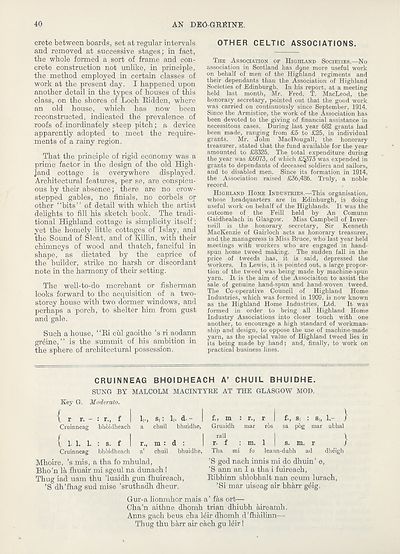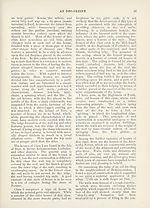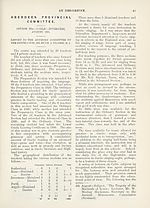An Comunn Gàidhealach Publications > Deo-gréine > Volume 17, October 1921 to September 1922
(48) Page 40
Download files
Complete book:
Individual page:
Thumbnail gallery: Grid view | List view

40
AN DEO-GBJ0INE.
crete between boards, set at regular intervals
and removed at successive stages; in fact,
the whole formed a sort of frame and con¬
crete construction not unlike, in principle,
the method employed in certain classes of
work at the present day. I happened upon
another detail in the types of houses of this
class, on the shores of Loch Bidden, where
an old house, which has now been
reconstructed, indicated the prevalence of
roofs of inordinately steep pitch; a device
apparently adopted to meet the require¬
ments of a rainy region.
That the principle of rigid economy was a
prime factor in the design of the old High¬
land cottage is everywhere displayed.
Architectural features, per se, are conspicu¬
ous by their absence; there are no crow-
stepped gables, no finials, no corbels or
other “bits” of detail with which the artist
delights to fill his sketch book. The tradi¬
tional Highland cottage is simplicity itself;
yet the homely little cottages of Islay, and
the Sound of Sleat, and of Killin, with their
chimneys of wood and thatch, fanciful in
shape, as dictated by the caprice of
the builder, strike no harsh or discordant
note in the harmony of their setting.
The well-to-do merchant or fisherman
looks forward to the acquisition of a two-
storey house with two dormer windows, and
perhaps a porch, to shelter him from gust
and gale.
Such a house, “Bi ciil gaoithe’s ri aodann
greine, ’ ’ is the summit of his ambition in
the sphere of architectural possession.
OTHER CELTIC ASSOCIATIONS.
The Association of Highland Societies.—No
association in Scotland has done more useful work
on behalf of men of the Highland regiments and
their dependants than the Association of Highland
Societies of Edinburgh. In his report, at a meeting
held last month, Mr. Fred. T. MacLeod, the
honorary secretary, pointed out that the good work
was carried on continuously since September, 1914.
Since the Armistice, the work of the Association has
been devoted to the giving of financial assistance in
necessitous cases. During last year 682 grants had
been made, ranging from £5 to £25, in individual
grants. Mr. John MacDougall, the honorary
treasurer, stated that the fund available for the year
amounted to £8325. The total expenditure during
the year was £6073, of which £§373 was expended in
grants to dependants of deceased soldiers and sailors,
and to disabled men. Since its formation in 1914,
the Association raised £36,486. Truly, a noble
record.
Highland Home Industries.—This organisation,
whose headquarters are in Edinburgh, is doing
useful work on behalf of the Highlands. It was the
outcome of the Feill held by An Comunn
Gaidhealach in Glasgow. Miss Campbell of Inver-
neill is the honorary secretary, Sir Kenneth
MacKenzie of Gairloch acts as honorary treasurer,
and the manageress is Miss Bruce, who last year held
meetings with workers who are engaged in hand-
spun home tweed making. The sudden fall in the
price of tweeds has, it is said, depressed the
workers. In Lewis, it is pointed out, a large propor¬
tion of the tweed was being made by machine-spun
yarn. It is the aim of the Associaiton to assist the
sale of genuine hand-spun and hand-woven tweed.
The Co-operative Council of Highland Home
Industries, which was formed in 1909, is now known
as the Highland Home Industries, Ltd. It was
formed in order to bring all Highland Home
Industry Associations into closer touch with one
another, to encourage a high standard of workman¬
ship and design, to oppose the use of machine-made
yarn, as the special value of Highland tweed lies in
its being made by hand; and, finally, to work on
practical business lines.
CRUINNEAG BHOIDHEACH A’ CHUIL BHUIDHE.
SUNG BY MALCOLM MACINTYRE AT THE GLASGOW MOD.
Key G. Moderate.
{ r r. - : r., f | 1|., s,: lt, d. - |
Cruinneag bhoidheach a chuil bhuidhe,
{ 1. 1. 1. : s. f I r., m : d
Cruinneag bhoidheach a’ chuil bhuidhe,
Mhoire, ’s mis, a tha fo mhulad,
Bho’n Ik fhuair mi sgeul na dunach!
Thug iad uam thu ’luaidh gun fhuireach,
’S dh’fhag sud mise ’sruthadh dheur.
f., m : r., r | f., s : s,, 1.- j
Gruaidh mar ros sa pog mar ubhal
I rail I 1
I r. f : m. 1 | s. m. r j
Tha mi fo leann-dubh ad dheigh
’S ged nach innis mi do dhuin’ e,
’S ann an I a tha i fuireach,
Bibhinn shiobhalt nan ceum lurach,
’Si mar uiseag air bharr geig.
Gur-a lionmhor mais a’ fks ort—
Cha’n aithne dhomh trian dhiubh aireamh.
Anns gach beus cha Mir dhomh d’fhkilinn—
Thug thu bkrr air ckch gu Mir I
AN DEO-GBJ0INE.
crete between boards, set at regular intervals
and removed at successive stages; in fact,
the whole formed a sort of frame and con¬
crete construction not unlike, in principle,
the method employed in certain classes of
work at the present day. I happened upon
another detail in the types of houses of this
class, on the shores of Loch Bidden, where
an old house, which has now been
reconstructed, indicated the prevalence of
roofs of inordinately steep pitch; a device
apparently adopted to meet the require¬
ments of a rainy region.
That the principle of rigid economy was a
prime factor in the design of the old High¬
land cottage is everywhere displayed.
Architectural features, per se, are conspicu¬
ous by their absence; there are no crow-
stepped gables, no finials, no corbels or
other “bits” of detail with which the artist
delights to fill his sketch book. The tradi¬
tional Highland cottage is simplicity itself;
yet the homely little cottages of Islay, and
the Sound of Sleat, and of Killin, with their
chimneys of wood and thatch, fanciful in
shape, as dictated by the caprice of
the builder, strike no harsh or discordant
note in the harmony of their setting.
The well-to-do merchant or fisherman
looks forward to the acquisition of a two-
storey house with two dormer windows, and
perhaps a porch, to shelter him from gust
and gale.
Such a house, “Bi ciil gaoithe’s ri aodann
greine, ’ ’ is the summit of his ambition in
the sphere of architectural possession.
OTHER CELTIC ASSOCIATIONS.
The Association of Highland Societies.—No
association in Scotland has done more useful work
on behalf of men of the Highland regiments and
their dependants than the Association of Highland
Societies of Edinburgh. In his report, at a meeting
held last month, Mr. Fred. T. MacLeod, the
honorary secretary, pointed out that the good work
was carried on continuously since September, 1914.
Since the Armistice, the work of the Association has
been devoted to the giving of financial assistance in
necessitous cases. During last year 682 grants had
been made, ranging from £5 to £25, in individual
grants. Mr. John MacDougall, the honorary
treasurer, stated that the fund available for the year
amounted to £8325. The total expenditure during
the year was £6073, of which £§373 was expended in
grants to dependants of deceased soldiers and sailors,
and to disabled men. Since its formation in 1914,
the Association raised £36,486. Truly, a noble
record.
Highland Home Industries.—This organisation,
whose headquarters are in Edinburgh, is doing
useful work on behalf of the Highlands. It was the
outcome of the Feill held by An Comunn
Gaidhealach in Glasgow. Miss Campbell of Inver-
neill is the honorary secretary, Sir Kenneth
MacKenzie of Gairloch acts as honorary treasurer,
and the manageress is Miss Bruce, who last year held
meetings with workers who are engaged in hand-
spun home tweed making. The sudden fall in the
price of tweeds has, it is said, depressed the
workers. In Lewis, it is pointed out, a large propor¬
tion of the tweed was being made by machine-spun
yarn. It is the aim of the Associaiton to assist the
sale of genuine hand-spun and hand-woven tweed.
The Co-operative Council of Highland Home
Industries, which was formed in 1909, is now known
as the Highland Home Industries, Ltd. It was
formed in order to bring all Highland Home
Industry Associations into closer touch with one
another, to encourage a high standard of workman¬
ship and design, to oppose the use of machine-made
yarn, as the special value of Highland tweed lies in
its being made by hand; and, finally, to work on
practical business lines.
CRUINNEAG BHOIDHEACH A’ CHUIL BHUIDHE.
SUNG BY MALCOLM MACINTYRE AT THE GLASGOW MOD.
Key G. Moderate.
{ r r. - : r., f | 1|., s,: lt, d. - |
Cruinneag bhoidheach a chuil bhuidhe,
{ 1. 1. 1. : s. f I r., m : d
Cruinneag bhoidheach a’ chuil bhuidhe,
Mhoire, ’s mis, a tha fo mhulad,
Bho’n Ik fhuair mi sgeul na dunach!
Thug iad uam thu ’luaidh gun fhuireach,
’S dh’fhag sud mise ’sruthadh dheur.
f., m : r., r | f., s : s,, 1.- j
Gruaidh mar ros sa pog mar ubhal
I rail I 1
I r. f : m. 1 | s. m. r j
Tha mi fo leann-dubh ad dheigh
’S ged nach innis mi do dhuin’ e,
’S ann an I a tha i fuireach,
Bibhinn shiobhalt nan ceum lurach,
’Si mar uiseag air bharr geig.
Gur-a lionmhor mais a’ fks ort—
Cha’n aithne dhomh trian dhiubh aireamh.
Anns gach beus cha Mir dhomh d’fhkilinn—
Thug thu bkrr air ckch gu Mir I
Set display mode to:
![]() Universal Viewer |
Universal Viewer | ![]() Mirador |
Large image | Transcription
Mirador |
Large image | Transcription
| An Comunn Gàidhealach > An Comunn Gàidhealach Publications > Deo-gréine > Volume 17, October 1921 to September 1922 > (48) Page 40 |
|---|
| Permanent URL | https://digital.nls.uk/127170549 |
|---|
| Description | Leabhar 17, Treasamh Mios an Fhoghair 1921 gu Dara Mìos an Fhoghair 1922 |
|---|---|
| Attribution and copyright: |
|
| Description | This contains items published by An Comunn, which are not specifically Mòd-related. It includes journals, annual reports and corporate documents, policy statements, educational resources and published plays and literature. It is arranged alphabetically by title. |
|---|
| Description | A collection of over 400 items published by An Comunn Gàidhealach, the organisation which promotes Gaelic language and culture and organises the Royal National Mòd. Dating from 1891 up to the present day, the collection includes journals and newspapers, annual reports, educational materials, national Mòd programmes, published Mòd literature and music. |
|---|---|
| Additional NLS resources: |
|

